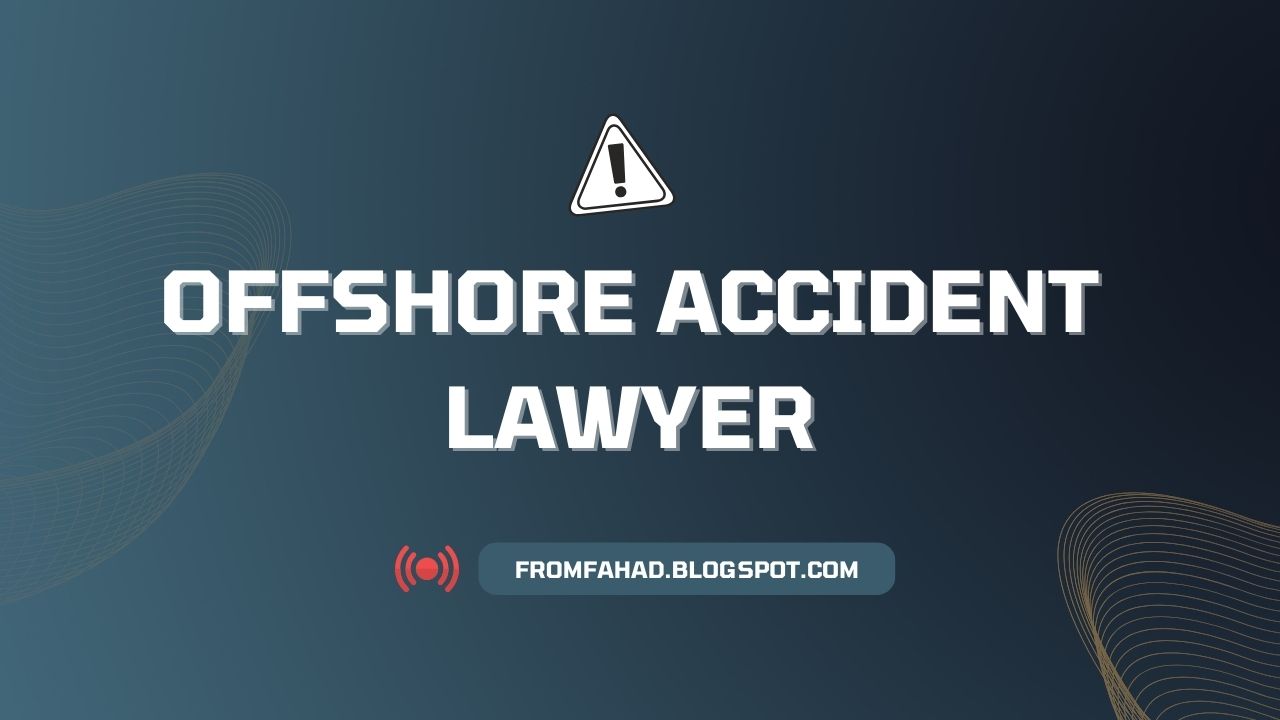
|
Offshore Accident Lawyer: Your Legal Guardian on Troubled Waters
In the realm of maritime ventures, where the vastness of the sea meets the complexity of law, the role of an offshore accident lawyer becomes paramount. These legal guardians are the unsung heroes who navigate the intricate waters of maritime law to ensure justice for those who face adversity at sea. In this comprehensive article, we will delve into the world of offshore accident lawyers, exploring their significance, responsibilities, and the essential aspects of maritime law that govern accidents on the high seas.
Understanding Offshore Accidents
What Constitutes an Offshore Accident?
Before we dive deeper into the role of an offshore accident lawyer, it's imperative to grasp what defines an offshore accident. These incidents occur in various maritime settings, including offshore drilling rigs, fishing vessels, cargo ships, and cruise liners. They encompass a wide range of mishaps such as:
Slip and Falls: Accidents resulting from slippery decks or inadequate safety measures.
Collisions: When two or more vessels collide, often due to navigational errors.
Equipment Failures: Accidents caused by malfunctioning machinery or equipment.
Toxic Exposure: Instances of exposure to hazardous chemicals or substances.
Injuries from Accidents: Bodily harm resulting from accidents like fires or explosions.
The Role of an Offshore Accident Lawyer
An offshore accident lawyer is a legal expert specializing in maritime law and personal injury claims related to accidents at sea. Their responsibilities encompass:
1. Legal Representation
These lawyers serve as advocates for victims of offshore accidents. They provide legal representation to individuals who have suffered injuries, ensuring their rights are protected and justice is served.
2. Investigative Expertise
Offshore accident lawyers conduct thorough investigations to determine the cause of the accident. This involves collecting evidence, interviewing witnesses, and collaborating with maritime experts.
3. Navigating Maritime Law
Navigating the intricate web of maritime law is no small feat. Offshore accident lawyers are well-versed in the Jones Act, the Longshore and Harbor Workers' Compensation Act, and other relevant regulations that govern maritime accidents.
4. Negotiation and Litigation
These professionals negotiate settlements with responsible parties or litigate cases in court when necessary. Their goal is to secure fair compensation for their clients, covering medical bills, lost wages, and pain and suffering.
The Jones Act: A Key Player
Understanding the Jones Act
The Jones Act, formally known as the Merchant Marine Act of 1920, is a pivotal piece of legislation that offers protection and rights to maritime workers who are injured on the job. It allows injured seamen to seek compensation from their employers, making it a cornerstone of offshore accident cases.
Qualifications for Jones Act Coverage
To qualify for Jones Act coverage, a maritime worker must meet specific criteria:
Must be classified as a "seaman."
Must be working on a "vessel in navigation."
The accident must have occurred due to the negligence of the employer or vessel owner.
Pursuing Justice: The Legal Process
When pursuing a legal claim after an offshore accident, there are essential steps to follow:
1. Seek Medical Attention
Immediate medical attention is crucial. It not only ensures your well-being but also establishes a medical record of your injuries.
2. Report the Accident
Notify your employer or vessel owner about the accident promptly. This step is vital for legal documentation.
3. Consult an Offshore Accident Lawyer
Reach out to an experienced offshore accident lawyer who can assess your case and guide you through the legal process.
4. Collect Evidence
Gather evidence such as accident reports, witness statements, and medical records to strengthen your claim.
5. Negotiate or Litigate
Your lawyer will negotiate with the responsible parties to secure a fair settlement. If negotiations fail, litigation may be necessary.
Conclusion
In the unpredictable world of offshore work, accidents can happen. When they do, offshore accident lawyers are the beacon of hope for those in distress. They navigate the complexities of maritime law to ensure that justice is served, offering a lifeline to those who find themselves in troubled waters.
FAQs
1. How much does it cost to hire an offshore accident lawyer?
The cost of hiring an offshore accident lawyer varies but is often based on a contingency fee, meaning they only get paid if you win your case.
2. Can I file a lawsuit if I'm injured while working on an offshore oil rig?
Yes, you can file a lawsuit if you're injured while working on an offshore oil rig. The Jones Act provides legal avenues for such cases.
3. What compensation can I expect for my offshore accident claim?
Compensation for offshore accident claims may include medical expenses, lost wages, pain and suffering, and more, depending on the circumstances of the accident.
4. How long do I have to file an offshore accident claim?
The statute of limitations for offshore accident claims varies by jurisdiction, so it's crucial to consult with an attorney promptly to ensure you don't miss the deadline.
5. Are offshore accident lawyers only for workers, or can passengers on cruise ships also hire them?
Offshore accident lawyers can represent both maritime workers and passengers on cruise ships who have suffered injuries due to accidents or negligence.

